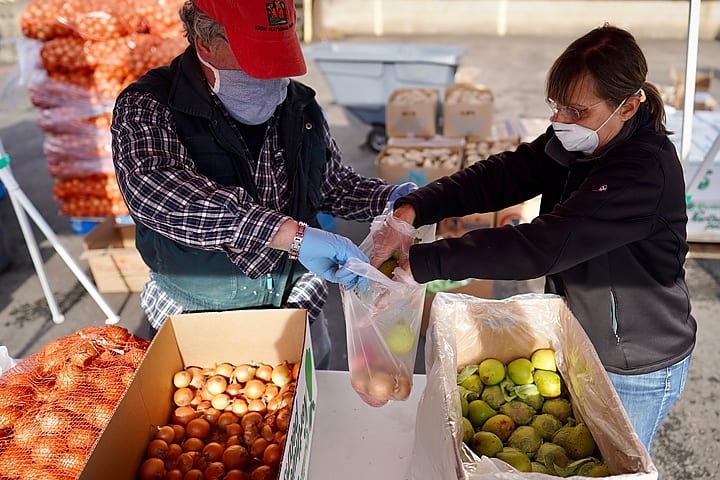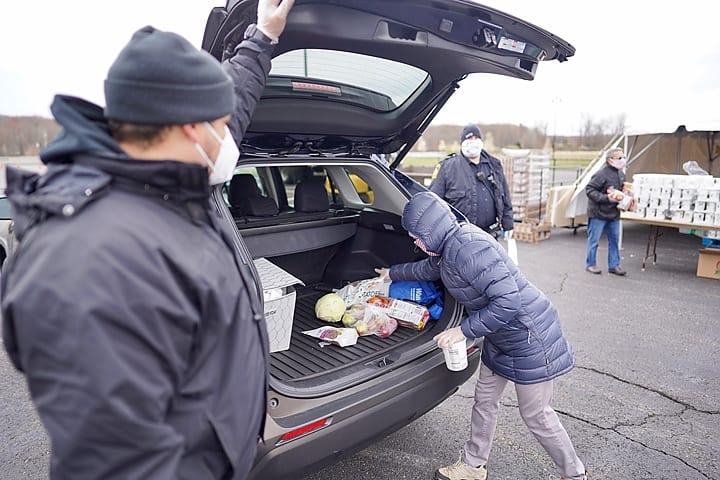Nonprofits Devastated as Demand for Services Spikes

Audio By Carbonatix

A volunteer helps bag up produce for residents in need at Foodshare in Bloomfield. Photo courtesy of Foodshare (we-ha.com file photo)
Foodshare President Jason Jakubowski said the organization has had to hire temporary workers to fill a gap due to the absence of a corporate volunteer base, while the cost of its distribution at Rentschler Field runs about $50,000 a week.
By Steve Jensen, CTNewsJunkie.com
At the same time as the economic blow of COVID-19 makes it harder for many families to put enough food on the table, the pandemic has decimated the workforce at one of Connecticut’s major food banks that annually provides millions of meals.
“We typically have 6,500 volunteers per year,” who are mostly employees at Hartford-area corporations that now work from home, said Jason Jakubowski, president of Foodshare. “But from the earliest days of COVID, our corporate volunteer base has almost completely disappeared. As a result, we have had to hire more than a dozen part-time temporary workers to fill in the gaps – and that has proven costly.”
Those financial and staffing challenges presented by the pandemic are confronting the majority of Connecticut’s nonprofit providers, who are seeing an unprecedented spike in need for their services. Some fear they will have to close their doors before the end of the year.
Their concerns are documented in a recent survey conducted by The CT Community Nonprofit Alliance, which represents hundreds of human service and arts and culture nonprofit organizations across the state.
The survey of 258 providers – primarily serving the elderly, youths, low-income households and people with disabilities – was conducted in late June and early July.
It shows that while some organizations have been able to cobble together financial and other resources to meet “unprecedented needs,” the pandemic is broadly threatening nonprofits’ ability to remain in business without significant funding from the state and federal government.
“COVID-19 has challenged community nonprofits in every possible way, from fundraising through the delivery of services,” said Alliance President and CEO Gian-Carl Casa. “Many human service providers on the frontlines of the crisis have struggled to continue to keep their doors open, while protecting both employees and the people they serve. If our members are going to stay in business and continue to deliver services that people need, it is more important than ever that they be properly funded.”
More than 20% of nonprofits surveyed believe they are somewhat or very unlikely to be able to fully fund payroll for the next three months, and nearly 30% are concerned about being able to fully provide services in that same time frame.
The most critical client needs identified by the survey are food security, mental health services, housing assistance and employment supports.
“Parents have lost their jobs, most of my families need food, reduced tuition for childcare, medicine, food, diapers, a place to live,” wrote one respondent quoted in the survey.
For the nonprofits themselves, 76% of respondents have concerns about reopening and resuming full operations due to issues such as the safety of clients and workers and access to PPE. Another 64% said their biggest obstacle is financial.
“Payroll is our largest expense, and every payroll brings a concern about available cash,” said Nancy Waterman, CFO at the Perception Programs adult behavioral health services agencies in Willimantic and Danielson. “We also worry about losing funding. It has already happened with one of our programs. Without state funding, we have to close the program down.”
With a continuing increase in demand for services expected from a second wave of COVID-19 infections this fall and winter, the survey listed several priorities the nonprofits are advocating in order to stay afloat, including:
- Access to state and federal relief funds, loan programs, grants, and all other mechanisms, including fee-for-service payments and Medicaid-funded services. Many providers have relied on the now-expired federal Paycheck Protection Program to stay in business.
- Another relief package from Congress specifically funding nonprofit-provided services, the staff working for nonprofits on the front lines, and supports for people served by nonprofits like increased unemployment payments.
- More flexibility to spend state dollars as needed, such as the purchase of PPE, and to allow providers to retain any state funds at the end of the fiscal year.
Casa emphasized that the state’s nonprofit providers have been underfunded for a dozen years, leaving them $461 million behind even before the pandemic struck. It’s a message they took to the Capitol in February, before the extent of the damage to the state’s families and economy was known.

Volunteers help load food donations at Foodshare in Bloomfield. Courtesy of Foodshare
“If we want essential services to be here when COVID is past, the state needs to commit to keeping them whole,” he said. “It hasn’t done that. Without government making up the difference, services will be reduced, jobs will be lost, doors will close and Connecticut’s quality-of-life will be hurt.”
Many nonprofits in the survey say they have adapted to the pandemic by emphasizing online services such as telehealth, allowing clients remote access to screenings and counseling.
“Telehealth is yielding promising results that suggest continuing to use these systems will lead to increased service delivery, efficiency, and effectiveness … during and beyond the current pandemic,” the survey concluded.
Services such as supplying food to those in need, however, cannot be done digitally.
Foodshare just finished its 24th week of running a hugely-attended food distribution event at Rentschler Field in East Hartford, which has a weekly bill of about $50,000. Private donations of money and food are keeping the event and the organization running for the time being, but Jakubowski wonders how long that can be sustained.
“COVID has literally cost us millions,” he said. “The generosity of individuals and corporations and philanthropic foundations is the only thing keeping us going right now.”
Republished with permission from CTNewsJunkie.com, all rights reserved.
Like what you see here? Click here to subscribe to We-Ha’s newsletter so you’ll always be in the know about what’s happening in West Hartford! Click the blue button below to become a supporter of We-Ha.com and our efforts to continue producing quality journalism.



